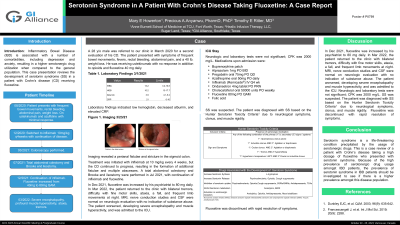Sunday Poster Session
Category: IBD
P0799 - Serotonin Syndrome in a Patient with Crohn’s Disease Taking Fluoxetine: A Case Report
Sunday, October 22, 2023
3:30 PM - 7:00 PM PT
Location: Exhibit Hall

Has Audio

Mary Howerton, BS
Anne Burnett Marion School of Medicine at TCU
FORT WORTH, TX
Presenting Author(s)
Mary Howerton, BS1, Precious Anyanwu, PharmD, PhD2, Timothy E.. Ritter, MD3
1Anne Burnett Marion School of Medicine at TCU, Fort Worth, TX; 2Healix, LLC, Houston, TX; 3GI Alliance, Southlake, TX
Introduction: Inflammatory Bowel Disease (IBD) is associated with a number of comorbidities, including depression and anxiety, resulting in a higher serotonergic drug utilization when compared to the general population. This case presentation reviews the development of serotonin syndrome (SS) in a patient with Crohn’s disease (CD) receiving fluoxetine.
Case Description/Methods: A 28 y/o male was referred to our clinic in Mar 2020 for a second evaluation of his CD. The patient presented with symptoms of frequent bowel movements, fevers, rectal bleeding, abdominal pain, and a 40 lb. weight loss. He was receiving ustekinumab with no response in addition to opioids and fluoxetine 40 mg daily. Laboratory findings indicated low hemoglobin, decreased albumin, and elevated CRP. Imaging revealed a perianal fistulae and perirectal abscess. Treatment was initiated with infliximab at 10 mg/kg every 4 weeks, but the CD continued to progress, resulting in the formation of additional fistulae and multiple abscesses. A total abdominal colectomy and Brooke end ileostomy were performed in Jul 2021, with continuation of infliximab and fluoxetine. In Dec 2021, fluoxetine was increased by his psychiatrist to 80 mg daily. In Mar 2022, the patient returned to the clinic with bilateral tremors, difficulty with fine motor skills, ataxia, a fall, and frequent limb movements at night. MRI, nerve conduction studies and CSF were normal on neurologic evaluation with no indication of substance abuse. The patient worsened, developing severe encephalopathy and muscle hyperactivity, and was admitted to the ICU. Neurologic and laboratory tests were not significant; CPK was 2000 mg/L. SS was suspected. The patient was diagnosed with SS based on the Hunter Serotonin Toxicity Criteria1 due to neurological symptoms, clonus, and muscle rigidity. Fluoxetine was discontinued with rapid resolution of symptoms.
Discussion: This is the first report of SS in a patient with IBD on high dose fluoxetine. SS includes a triad of altered mental status, autonomic hyperactivity, and neuromuscular abnormalities1, seen with medications which increase the activation of 5-HT receptors in the body, including SSRIs and others2. High use of SSRIs in IBD patients, along with the need for opioids and other drugs affecting serotonin uptake puts this population at risk. The prevalence of SS in IBD patients should be further investigated. References: 1. Dunkley EJC, et al. QJM-Int J Med. 2003; 96:635-642 2. Francescangeli J, et al. Int J Mol Sci. 2019; 20:2288
Disclosures:
Mary Howerton, BS1, Precious Anyanwu, PharmD, PhD2, Timothy E.. Ritter, MD3. P0799 - Serotonin Syndrome in a Patient with Crohn’s Disease Taking Fluoxetine: A Case Report, ACG 2023 Annual Scientific Meeting Abstracts. Vancouver, BC, Canada: American College of Gastroenterology.
1Anne Burnett Marion School of Medicine at TCU, Fort Worth, TX; 2Healix, LLC, Houston, TX; 3GI Alliance, Southlake, TX
Introduction: Inflammatory Bowel Disease (IBD) is associated with a number of comorbidities, including depression and anxiety, resulting in a higher serotonergic drug utilization when compared to the general population. This case presentation reviews the development of serotonin syndrome (SS) in a patient with Crohn’s disease (CD) receiving fluoxetine.
Case Description/Methods: A 28 y/o male was referred to our clinic in Mar 2020 for a second evaluation of his CD. The patient presented with symptoms of frequent bowel movements, fevers, rectal bleeding, abdominal pain, and a 40 lb. weight loss. He was receiving ustekinumab with no response in addition to opioids and fluoxetine 40 mg daily. Laboratory findings indicated low hemoglobin, decreased albumin, and elevated CRP. Imaging revealed a perianal fistulae and perirectal abscess. Treatment was initiated with infliximab at 10 mg/kg every 4 weeks, but the CD continued to progress, resulting in the formation of additional fistulae and multiple abscesses. A total abdominal colectomy and Brooke end ileostomy were performed in Jul 2021, with continuation of infliximab and fluoxetine. In Dec 2021, fluoxetine was increased by his psychiatrist to 80 mg daily. In Mar 2022, the patient returned to the clinic with bilateral tremors, difficulty with fine motor skills, ataxia, a fall, and frequent limb movements at night. MRI, nerve conduction studies and CSF were normal on neurologic evaluation with no indication of substance abuse. The patient worsened, developing severe encephalopathy and muscle hyperactivity, and was admitted to the ICU. Neurologic and laboratory tests were not significant; CPK was 2000 mg/L. SS was suspected. The patient was diagnosed with SS based on the Hunter Serotonin Toxicity Criteria1 due to neurological symptoms, clonus, and muscle rigidity. Fluoxetine was discontinued with rapid resolution of symptoms.
Discussion: This is the first report of SS in a patient with IBD on high dose fluoxetine. SS includes a triad of altered mental status, autonomic hyperactivity, and neuromuscular abnormalities1, seen with medications which increase the activation of 5-HT receptors in the body, including SSRIs and others2. High use of SSRIs in IBD patients, along with the need for opioids and other drugs affecting serotonin uptake puts this population at risk. The prevalence of SS in IBD patients should be further investigated. References: 1. Dunkley EJC, et al. QJM-Int J Med. 2003; 96:635-642 2. Francescangeli J, et al. Int J Mol Sci. 2019; 20:2288
Disclosures:
Mary Howerton indicated no relevant financial relationships.
Precious Anyanwu indicated no relevant financial relationships.
Timothy Ritter: Abbvie – Advisory Committee/Board Member, Speakers Bureau. ArdelyxArena – Advisory Committee/Board Member. Boehringer Ingelheim – Advisory Committee/Board Member. Bristol-Myers Squibb – Advisory Committee/Board Member, Speakers Bureau. Celgene – Advisory Committee/Board Member. Ferring – Advisory Committee/Board Member. Genentech/Roche Gilead – Advisory Committee/Board Member. Intercept – Advisory Committee/Board Member. Iterative Scopes – Advisory Committee/Board Member, Stock-publicly held company(excluding mutual/index funds). Janssen – Advisory Committee/Board Member, Speakers Bureau. Lilly – Advisory Committee/Board Member. Pfizer inc – Advisory Committee/Board Member, Speakers Bureau. Prometheus Biosciences – Advisory Committee/Board Member. Sanofi – Advisory Committee/Board Member. Takeda – Advisory Committee/Board Member, Speakers Bureau.
Mary Howerton, BS1, Precious Anyanwu, PharmD, PhD2, Timothy E.. Ritter, MD3. P0799 - Serotonin Syndrome in a Patient with Crohn’s Disease Taking Fluoxetine: A Case Report, ACG 2023 Annual Scientific Meeting Abstracts. Vancouver, BC, Canada: American College of Gastroenterology.

